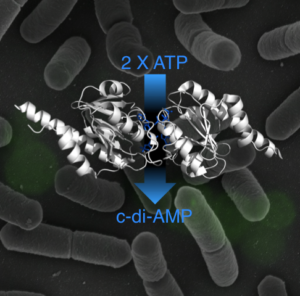Bacteria rely on complex signal transduction systems to cope with environmental changes and respond appropriately. One important environmental parameter is osmolarity. The second messenger c-di-AMP controls the uptake of osmolytes in the Gram-positive bacterium Listeria monocytogenes as well as in phylogenetically related bacteria.
The project aims at elucidating the molecular mechanism of how the c-di-AMP-synthesizing and -degrading enzymes sense osmolarity to adjust the cellular osmolyte concentration accordingly. Genetic, biochemical and structural methodologies are applied to unravel how c-di-AMP affects the activity of osmolyte transport systems in L. monocytogenes.


